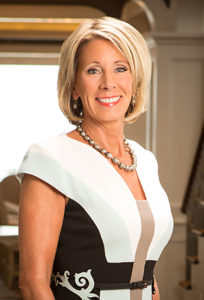
Critics of Betsy DeVos’ nomination as Secretary of Education have promoted a narrative that she is a free-market ideologue opposed to all education regulations.
But a step outside the shadow of the dysfunctional Detroit education system and a look at DeVos’ advocacy for private school choice paints a more nuanced picture.
A paper trail left by DeVos, and the advocacy foundations she led until recently, reveals a history of supporting choice programs that create academic, administrative and financial accountability for organizations that fund scholarships and schools that accept them (see page 24-25). She has also pushed private school choice programs to prioritize disadvantaged students.
“We target programs that are specifically geared to answer the needs of low-income parents and students,” she said during a 2015 interview.
These stances have sometimes triggered conflict with other groups that support vouchers and other forms of private school choice, but favor a more laissez-faire approach. School choice critics often omit differences of opinion that sometimes arise among voucher supporters. While these conflicts tend to be relatively minor in the scheme of things, they highlight competing philosophies and strategic approaches that shape the school choice movement.
A debate over tax credit scholarship reforms during Georgia’s most recent legislative session provides a telling case in point.
First created in 2008, Georgia’s Qualified Education Expense Tax Credit is a popular scholarship program with near-universal student eligibility. For the past several years, donors reached the $58 million funding cap within a single day.
The program, which is funded by tax-credit donations from individuals and helps students afford private-school tuition, has faced constant and ongoing criticism for lack of accountability and transparency. Near-universal eligibility, coupled with few reporting requirements for scholarship organizations, raised concerns about whether the program serves economically disadvantaged students. The program did not require testing of scholarship students. Donors were able to steer contributions to specific schools, which made it harder for students to switch schools once they received a scholarship. The program even allowed scholarship organizations to set aside millions of dollars in donations for future use, even as other scholarship organizations amassed waiting lists of students who wanted immediate access to scholarship funds.
According to the Georgia Department of Education, the lack of reporting meant the state didn’t know who was served by the program, or whether they benefited academically. Transparency was so poor that in 2012 The Society of Professional Journalists cited the program while awarding Georgia’s legislature a “Black Hole Award,” which “exposes the most heinous violations of the public’s right to know.”
All of this contributed to a political climate that stifled attempts to match the steady growth of private school choice programs in states like Florida and Indiana. Efforts to raise the cap on scholarship funding since 2011 have all failed.
The libertarian Cato Institute testified favorably about the program in 2015. Groups like the conservative Heritage Foundation, EdChoice (where I serve as a research fellow) and a local scholarship organization called Georgia GOAL all praised the program’s limited regulation.
But DeVos-chaired AFC saw flaws it wanted to correct. The organization backed legislation that would have created a new corporate income tax scholarship for students who qualified for free and reduced-price lunch. HB 865 (and previously HB 239 during the 2013-14 session), would have stipulated scholarship students would be given a national norm-referenced test with school-wide reporting on annual learning gains. The proposal would also have required statistical and financial reporting from scholarship organizations. Donors would be forbidden from targeting specific schools or religious affiliations and scholarship organizations would have two years to spend the donations on scholarships. Funding for the new program would be capped at $25 million, with no financial or regulatory impact on the existing program.
School choice experts from Cato, Heritage and EdChoice jointly authored an article citing concerns about the autonomy of scholarship granting organizations and calling the new program a “threat to a growing and successful type of educational choice.” GOAL, one of the state’s largest and most prominent scholarship organizations, opposed the bill and called the AFC-backed efforts “crony capitalism.”
The bill never made it out of the Republican-controlled House Ways and Means committee. But it illustrates the role DeVos has played within the private school choice movement.
The changes AFC sought would have created a program similar to the Florida tax credit scholarship program, which the group now cites as a model for the nation. The program is among the most heavily regulated tax credit scholarship programs in the nation, and it serves an economically disadvantaged student population.
DeVos has also praised the heavily regulated Indiana voucher program that requires private schools to employ state-certified teachers, be accredited, and use the state standards and tests. AFC was also involved in helping to pass Louisiana’s pilot voucher program in 2008. That program regulates private school admissions policies and requires participating private schools to administer the state test — and also has triggered debates among private school choice supporters.
There are reasonable arguments for, and against, many regulations, but as Cato’s Jason Bedrick wrote recently: “The idea that DeVos thinks ‘any regulation’ is ‘too much regulation‘ is sheer nonsense.”
Full disclosure: Betsy DeVos’ foundation made a donation to Step Up For Students (my employer and the publisher of this blog) in 2014 to help jump-start the new Gardiner Scholarship program for children with special needs.


